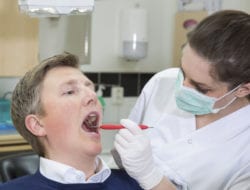 Periodontal disease is a common dental ailment diagnosed in one out of every two American adults that are 30 years old and older. That’s nothing to laugh at. In fact, periodontal disease- also known as gum disease- causes more lost teeth in adults in the developed world than any other condition. But gum disease endangers more than just your teeth. Research has linked it to Alzheimer’s, rheumatoid arthritis, pancreatic cancer, diabetes, stroke, heart disease and more! You may be thinking, “That sounds serious. I would definitely know if I had that. Right?” You may be surprised to learn that you’re already experiencing symptoms.
Periodontal disease is a common dental ailment diagnosed in one out of every two American adults that are 30 years old and older. That’s nothing to laugh at. In fact, periodontal disease- also known as gum disease- causes more lost teeth in adults in the developed world than any other condition. But gum disease endangers more than just your teeth. Research has linked it to Alzheimer’s, rheumatoid arthritis, pancreatic cancer, diabetes, stroke, heart disease and more! You may be thinking, “That sounds serious. I would definitely know if I had that. Right?” You may be surprised to learn that you’re already experiencing symptoms.
What Is Periodontal Disease?
Periodontal translates from Greek as “around the tooth”. Periodontal disease, sometimes known as periodontitis or more commonly as gum disease, is when the gum tissues surrounding your teeth and the jawbone that anchors the teeth in place become diseased. Bacteria in the mouth are the start of this illness. This bacteria spreads infections into the roots of teeth and gums and, if untreated, can cause tooth loss or even jawbone tissue loss.
Causes of Periodontal Disease
The primary cause of periodontal disease is allowing bacteria in plaque to go untreated. These bacteria in our mouths mix with mucus and other particles to form plaque on our teeth. The plaque that isn’t scoured away by brushing and flossing solidifies and forms tartar.
To purge the bacteria, our immune systems send defensive cells to those tissues. This causes the areas of gum tissue around the teeth to become inflamed. As the gum tissues swell, they pull away from the teeth, forming little pockets around our teeth, allowing more bacteria to settle into our gums.
Other factors that can lead to gum disease include:
- Genetics
- Poor nutrition
- Stress
- Smoking/tobacco use
- Hormonal changes (such as puberty, pregnancy, or menopause)
- Clenching or grinding teeth
- Certain illnesses
Stages Of Periodontal Disease
Inflammation of the gums when bone loss has not yet begun is called gingivitis. This form of the disease is mild and reversible and not all gingivitis progresses into gum disease. Plaque gathers on our teeth, causing our gums to become inflamed, but our teeth are still firmly planted in their sockets at this point. However, if this inflammation is left untreated, it can lead to full-fledged gum disease.
Periodontal disease is when the damage caused by the infection has reached and is affecting the underlying bone. At this stage, the pockets around teeth deepen, allowing even more gum tissue and bone to be affected. Eventually, due to loss of support from the gums, the teeth will loosen and fall out.
What Are the Symptoms of Periodontal Disease?
- Deep pockets between teeth and gums.
- Swollen or tender gums.
- Gums that bleed easily from brushing or flossing.
- Gums that pull away from teeth.
- Pus between your teeth and gums.
- Persistent bad breath or bad taste in the mouth.
- Changes in bite.
- Loose or shifting teeth.
- New spaces developing between your teeth.
When You Should See a Dentist
People with gum disease aren’t always experiencing pain; some people may not even be aware there is a problem in their mouths. A periodontal evaluation conducted by a dentist, complete with an x-ray, is the best way to diagnose the condition. If it’s been some time since you’ve seen your dentist or if you are experiencing any of the symptoms listed above, schedule an appointment with your dentist soon. Treating your periodontal disease now not only improves the health of your mouth and teeth but can also improve your chances of leading a longer, healthier life.
Dr. Leonard Hess of Monroe NC wants to help you prevent, diagnose, and treat periodontal disease. Regular cleanings, check-up’s and minimally invasive treatments should be enough to protect your teeth and gums from major cases of periodontal disease. However, if your gums are bleeding anyway, you may be suffering from gum disease. Don’t wait to find out! Contact us online today to schedule an appointment or call 704.240.5045.
